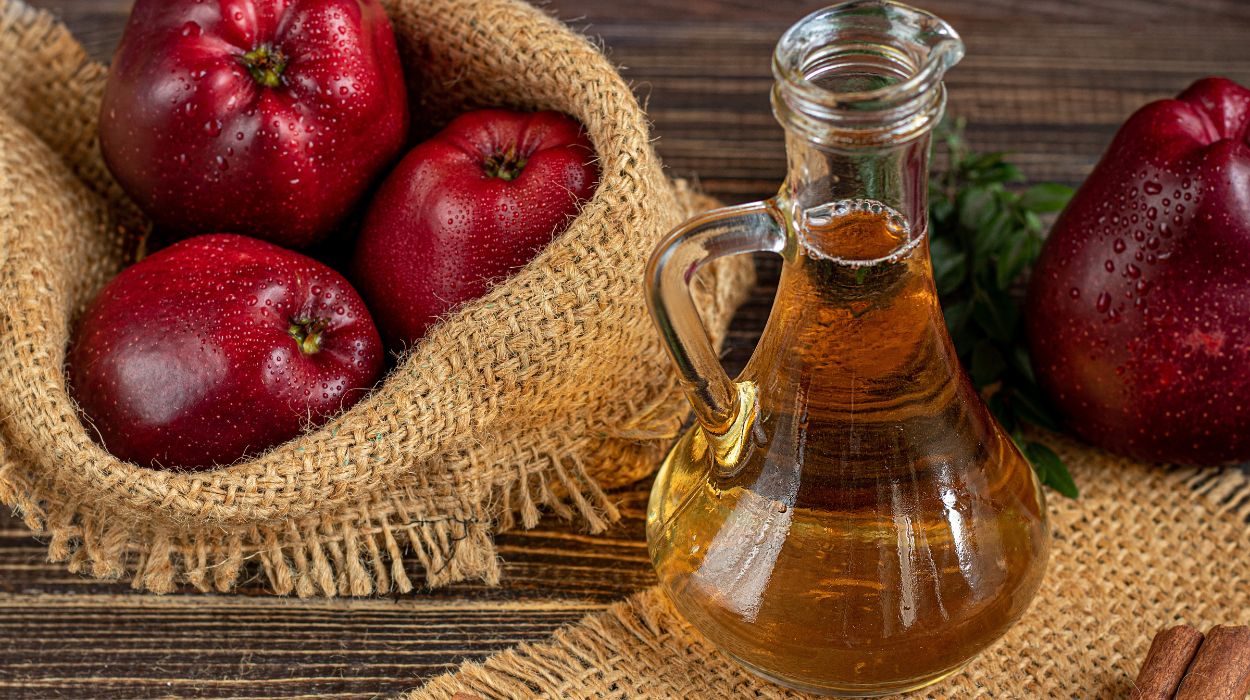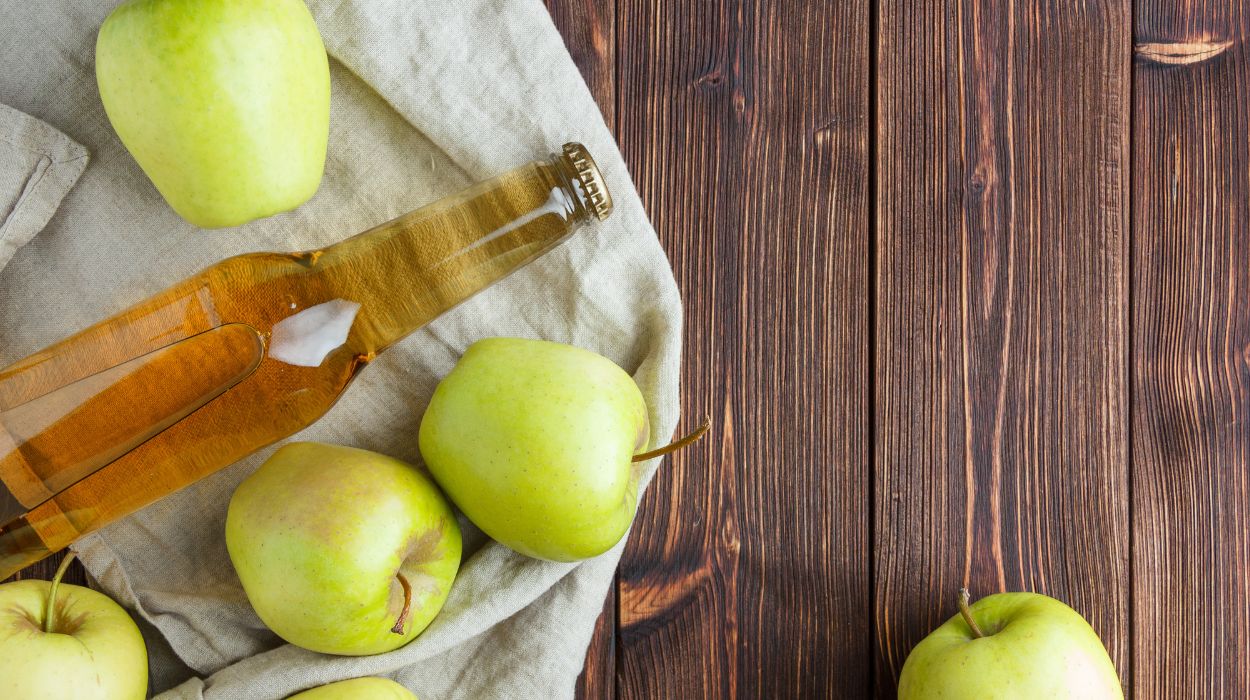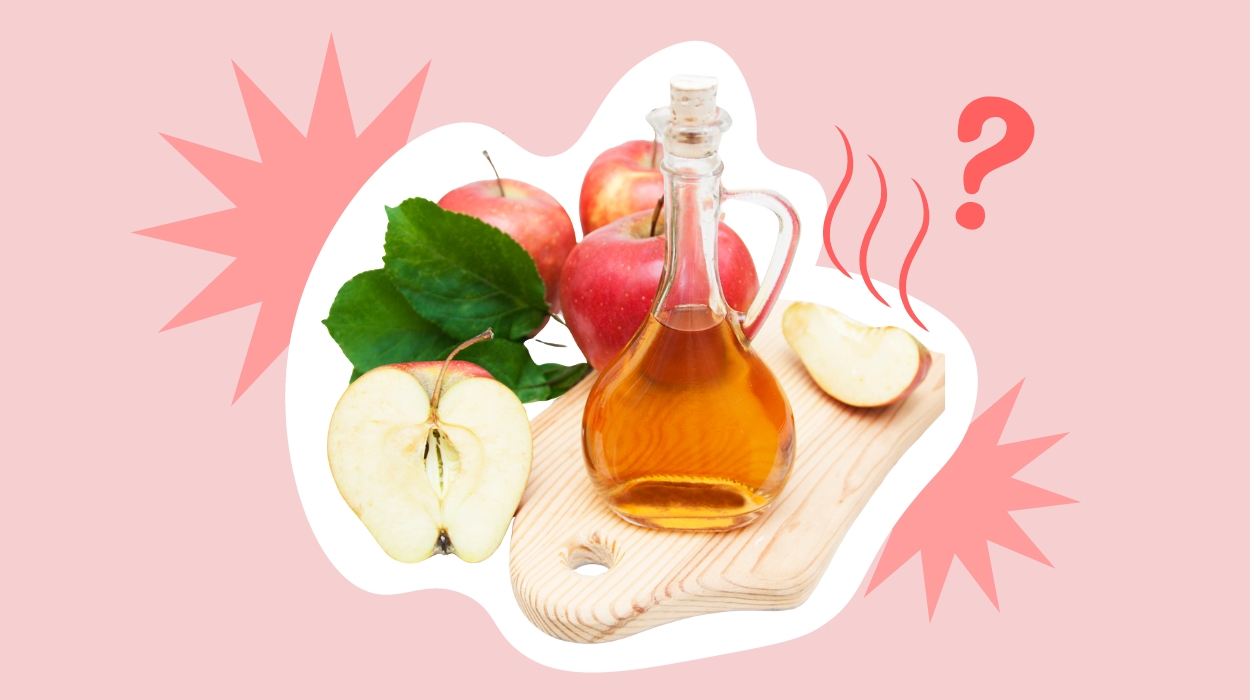Apple cider vinegar, or ACV, is a product of fermented apples. Commonly used as a food enhancer or salad dressing, ACV is also known for its potential health benefits. Some health enthusiasts are drinking apple cider vinegar for its beneficial qualities.
Scientific evidence within the past decade indicates that ACV may provide some health perks[1] due to its biologically active compounds. Apple cider vinegar contains certain nutritional components that supply antioxidant qualities.[2] Experts agree that more research in this area is needed to determine its full potential for health applications.
You may be wondering if you should stock up or if apple cider vinegar goes bad. Since it is a fermented product, it has a longer shelf life than unfermented products. The bioactive compounds resulting from the fermentation process aid in the longevity of products like ACV.
That being so, does ACV go bad? Let’s find out.
Does Apple Cider Vinegar Expire?
Technically, apple cider vinegar does not expire because it contains natural bacteria and yeast as a product of its fermentation. Acetic acid bacteria and yeast help ACV to be naturally self-preserving. However, ACV must be stored properly to maintain its natural components and stay fresh.
Does Apple Cider Vinegar Go Bad?

Technically, a bottle of apple cider vinegar can last indefinitely as long as it is sealed in an airtight container and stored in a cool dark place for optimal quality. An expiration date on a bottle of apple cider vinegar does not carry the same weight as other products.
Thus, can apple cider vinegar go bad? It is unlikely due to its natural microbial components and acidic nature. ACV’s biological compounds support its long shelf life.
The process[3] that changes apples to cider and then vinegar yields biologically beneficial bacteria. Yeast ferments the sugar from apples into cider. Ethanol, a plant-derived alcohol, is a product of that process. Acetic acid is then formed through oxidation processes and microbial activity.
Acetic acid bacteria form a layer of cell material as a natural byproduct of its functioning. In raw or unfiltered ACV, this cloudy stuff is known as the mother.[4] Vinegar mother contains vitamins, minerals, phenolic compounds, organic acids, and other biologically active substances that provide antioxidant properties.[4]
How Long Does Apple Cider Vinegar Last?
Exactly how long does apple cider vinegar last? An unopened bottle of apple cider vinegar can last forever since it has natural self-preserving qualities. You will find an expiration date printed on the bottle per the manufacturer, but the Food and Drug Administration[5] only requires expiration dates on infant formula.
There are some rules you should follow to keep your ACV at the top of its game. The nutritional value may diminish over time unless stored properly. Therefore, while ACV may age and lose some of its perks, it can still be consumed after the printed expiration date.
How long does apple cider vinegar last once opened? Some say two to three years is safe for consumption, but it depends on how you store your ACV. Still, others state it never goes bad.
However, official evidence is lacking to answer this question definitively.
How Apple Cider Vinegar Changes Over Time

Vinegar, like any natural product, changes over time. ACV continues to age in the bottle once exposed to air. The flavor or color may be different, but it is still safe to use.
Older vinegar may present with a cloudy appearance, especially if unfiltered. Apple cider vinegar containing the mother may look murky as it ages to more sediment.
How can you tell if apple cider vinegar is bad? Be aware that if the color, taste, or smell of your ACV changes significantly, it may be due to unhealthy microorganisms, and you should throw it out and get a fresh bottle.
How To Store Apple Cider Vinegar
Proper storage of ACV is essential to keeping nutrient levels high and protecting the natural bacteria. The quality and shelf life depend on the environment your apple cider vinegar is kept.
Experts recommend specific storage tips to maintain your ACV. Avoid using a plastic container since the highly acidic nature of vinegar can leach plastic particles into your ACV. It should be tightly closed in a glass bottle, preferably in the kitchen pantry or away from direct sunlight and heat.
Possible Benefits Of Apple Cider Vinegar For Health
More and more it seems those seeking alternative health support search for natural remedies. Research indicates that the natural antimicrobial,[6] anti-inflammatory, and high antioxidant qualities that are associated with apple cider vinegar may provide health benefits.
Some people do not prefer the sour taste of apple cider vinegar. Another option, instead of using it straight out of the bottle is to try dietary supplements. ACV gummies or pills would be more palatable for those with an aversion to strong vinegar but want to try ACV for its natural antimicrobial properties.
Cardiovascular And Endocrine System Support
A systematic review was performed involving the effects of apple vinegar on weight and metabolic conditions[7] such as type 2 diabetes. The aim was to determine if apple cider vinegar may decrease blood sugar or support weight loss. The results noted there were beneficial effects of ACV use.
A study the following year looked at the possible blood sugar and cholesterol-lowering effects of[8] apple cider vinegar and found a favorable response toward both. Researchers noted to be cautious of these findings due to experiment limitations. A recent 2023 study noted ACV consumption positively responded to decreasing heart disease risk[1] factors via reduced total cholesterol and fasting blood sugar.
Claims that apple cider vinegar aids weight loss continue to be studied, but experts have not concluded that apple cider vinegar causes weight loss. Clinical trials demonstrated that in combination with a calorie-restricted diet,[9] ACV may support appetite suppression and decrease body weight.
Digestive And Immune System Support
Evidence of potential health benefits of apple cider vinegar consumption regarding digestive health. ACV supplies probiotics, or good bacteria, which support digestion[10] and the immune system. Apple cider vinegar’s antibacterial characteristics demonstrated possible inhibitory effects[11] against Candida albicans, Escherichia coli, and Staphylococcus aureus.
Women’s Health
Evidence of ACV’s effects on Candida albicans may benefit women’s health by helping them manage yeast infections.[6] Another possible female benefit of apple cider vinegar may be treating Polycystic Ovarian Syndrome or PCOS. Decreased insulin resistance and helped regulate hormones associated with PCOS[12] in animal studies using AVC. There are insufficient studies involving human response to apple cider vinegar involving hormonal benefits.
Other Types Of Vinegar
All vinegar goes through a fermentation process to become vinegar. Evidence shows that many types of vinegar[13] have beneficial natural properties such as organic acids, bioactive antioxidant compounds, vitamins, and minerals. Consuming vinegar supplies your body with healthful nutrients;[13] Thus, you may consider adding it to your diet.
If apple cider vinegar is not tolerable for you or you just do not like the taste, you may benefit from other forms. Broken down into two groups;
Grain vinegar:
- Rice vinegar.
- Sorghum vinegar.
- Buckwheat vinegar.
- Oat vinegar.
- White vinegar.
Fruit vinegar:
- Balsamic vinegar.
- Red wine vinegar.
- Champagne vinegar.
- White wine vinegar.
- Persimmon vinegar.
Conclusion
Apple cider vinegar may last a long time if properly stored due to its natural acetic acid bacteria and yeast combination. It is self-preserving for the most part. The demand for fermented apple beverages and other products has become more prevalent in recent years due to their potential health benefits.
Research indicates that apple cider vinegar, due to its fermentation, aging, and oxidation processes, and the resulting products, may support a healthy lifestyle. As with many natural remedies, experts have not unequivocally determined that ACV is a solution for several health conditions. However, many studies indicate evidence that it may be helpful.
Frequently Asked Questions
Technically, the bottle will show an expiration date per manufacturer’s requirements.
The natural microbiota, or the mother in ACV, could go bad if not stored in a dark place to protect it.
The color and taste may change over time due to natural aging, but if the odor, taste, and color change significantly, it’s best to toss it and get a new bottle.
No refrigeration is required once opened. Store your ACV in an airtight bottle, in a pantry, or in a cupboard to protect it from sunlight, which can accelerate aging.
 Evidence Based
Evidence Based
